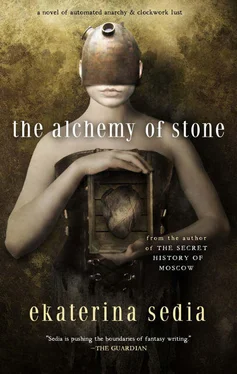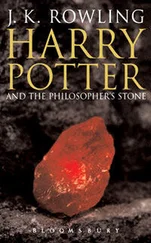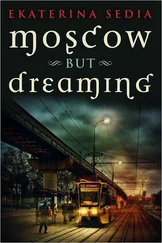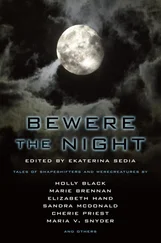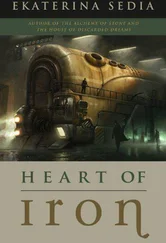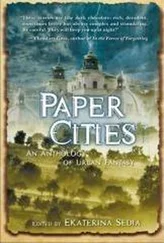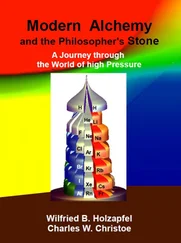She hoped that Ilmarekh would offer her some advice, but she knew that she was beyond advice, beyond being able to cheer up at mere words. She needed to do something.
Having made a decision, she turned around and marched away from the gates. She passed by the factories, under the low-hanging clouds of smoke and soot, through the incessant banging and clashing of the machinery; she walked past the hovels and the hollow-eyed old people who passed the last of their days looking for sun in the endless haze, and hacking up gray pieces of their lungs.
“Friends in high places,” Ilmarekh had told her the last time. Iolanda. Mattie was willing to overlook the friend-theft at the moment, and instead decided to ask Iolanda for one of her many promised favors. She needed to know what was the right thing to do, and how the two of them fitted inside the machine of the city, more metal than stone now.
Mattie headed north, for the wealthy district surrounding the former palace, where the houses were few and spacious, enveloped by delicately maintained gardens and tall hedges that tastefully contributed to the landscape yet managed to keep the owners’ private affairs in and the interlopers out. Her footfalls resonated in the wide, quiet streets lined with old shade trees that softened all other noises into a rich, velvety background that made her aware of her own noisy workings.
The wealthy district lay a good way away from the gates, nestled in the very heart of the stone city, embraced by the semicircle of the palace district in the south and the park on the north. There were a few ponds here the names of which Mattie did not know, but even they seemed different from the Grackle Pond—the water here was pure like crystal, with the barest hints of blue shadows playing within; the schools of red and orange fish—some solid, some patterned—played in the emerald green tangles of the lake grass, their quick shadows streaking across the white, sandy bottom.
Mattie had been here only once before, and she looked for Iolanda’s house. She did not know how she would recognize it, only that she would—every house here was elaborate, and Mattie thought she would spot Iolanda’s taste with ease.
She spent a long time wandering between the houses, studying the ornate ironwork on the gates, looking for any sign of Iolanda’s presence. Most of the residences stood empty since their inhabitants had left the city, but a few harbored signs of life—soft music and laughter wafted through the air, along with a light clinking of dishes and glasses. But the gates were locked, and no matter how hard she looked, she saw no sign of Iolanda.
She was ready to give up, and turned back, now lost in the maze of the wide, quiet streets. She felt even more alien in this eerie, luxurious place, and she hurried along, suddenly afraid. And then she saw people in the streets.
They did not belong here either. Dressed in cheap, rough clothes covered with coal dust, their faces gaunt and peppered with coal particles absorbed into their skin so that no soap could get them out. They moved in a silent, tight formation, their eyes unnaturally light in their darkened faces. Several of them carried torches, and they cast a troubled orange light over the trees and the streets.
Mattie got out of the way, flattening against an iron fence. The bars felt reassuring against the metal of her back as she watched the silent and somber procession pass by. The tide of miners did not stem—they filled the street, and Mattie tasted coal and hot metal in the air.
There were others too—not as stained as the rest, but just as gaunt and silent. For a moment, Mattie thought that these people were ghosts vomited up by the Soul-Smoker and given flesh through some perversion of nature, through the foul magic of smoke and clanging metal that filled the city, rendering flesh more and more obsolete each day, and this unwanted flesh now walked the streets, lost.
At first, they didn’t even look at Mattie, intent and determined. But as more and more men walked by, she noticed that a few glanced in her direction; when the end of the column was moving past her, they stared.
“Hey,” one of them called, breaking the silence. “Shouldn’t we do something about the clunker here?”
She was too scared to take offense as several men left their place in the column, creating a little eddy of people, and walked up to her.
“I’ve done nothing to you,” Mattie said.
“It talks,” one of them said, perplexed. “When did you learn to talk?”
“I always could,” Mattie said. “I’m not like the other machines. I’m emancipated.”
The man studied her, his narrow face unshaven and impenetrable. “We heard about the intelligent machine,” he said, finally.
“The one who tells the government what to do with us,” one of his fellows added. “Is it you? Is it you who took away our land and stuffed us into mines?”
“Their kind took our fields, too,” another one said.
Mattie shook her head and folded her hands. “No,” she said. “It’s not me, I swear. I’m just an alchemist, I make ointments. You want the Calculator by the Grackle Pond.”
“We’ll get to it in due time,” the first man said. “Now the question is, what to do with you?”
Mattie sensed restrained violence in the tense set of his shoulders, in the subtle tightening of his fists, knobby and disproportionately large on his thin forearms.
A shout from somewhere at the head of the procession tore at the silence, and there was a sound of smashed glass and whooping. More shouting, more noises, and a thin wisp of dirty smoke curled into the sky like a curlicue. Mattie’s interlocutors were compelled to look away, stretching their necks to see better.
Mattie bolted. The man closest to her gave a surprised gasp as she pushed him away, and reflexively his fist caught her on the cheek; she felt cracks opening in her face, blooming into stars, but already she ran, the wind hissing in the fissures of her porcelain mask.
The crowd had grown sparser and she had no trouble weaving her way between them. She was faster than any of them, and they seemed too preoccupied to pay her much mind. Her feet pounded the pavement, but instead of resonating loudly like before, her footfalls were nearly inaudible in the cacophony of destruction that erupted all around and behind her.
She heard a woman scream, and thought that the rioters had breached the gates somewhere and were destroying the houses. There was a smashing of glass, and a smell of burning wood and something else—hair? horn?—chased after her. Mattie tried not to think about Iolanda and Niobe, and yet she felt guilty that she was unable to find them— although what good would it have done? She felt a chip of porcelain detach from her cheek and heard it clink on the pavement.
Mattie slowed her steps only when she was certain that the rioters had passed by; even then, she walked quickly, clinging close to the walls of the buildings. There was no one in the streets, and only occasionally she saw a worried face peer through the shutters—a sign that the rioters had passed this way. As she approached the palace district (she still thought of it this way, even though there was no palace anymore), she saw several of the enforcers’ buggies, heading in the direction she came from. They swarmed by the Parliament, organizing, and she breathed a little easier. The riot would be over soon, and she only hoped that it would be stopped before Iolanda and Niobe were hurt. She felt guilty for her earlier resentment of them, as if her thoughts had brought them into danger.
They did not let her into the Parliament building, and she headed for Loharri’s house—it was closer than hers, and she was not ready to face Sebastian just yet. Sebastian. She thought about telling Loharri where he was, about the missing medallion and explosives. Surely, it would be a reason enough? And yet, her entire being cried out against it. It didn’t matter if he was the one who blew up the palace; it didn’t matter if he was involved in the riots somehow. She just couldn’t betray him. She had had enough of that for now. Instead, she wondered if perhaps Iolanda was visiting Loharri, and was thus spared the grisly fate Mattie tried really hard not to imagine.
Читать дальше
